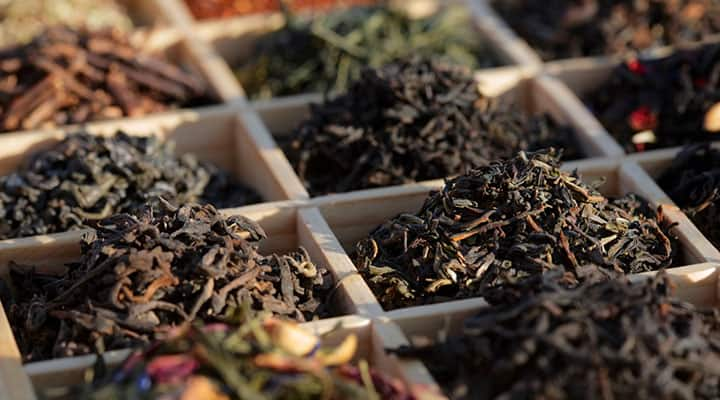
Tea, High-Flavonoid Foods May Lower Diabetes Risk
Tea, High-Flavonoid Foods May Lower Diabetes Risk
If you're striving to stave off type 2 diabetes—a chronic disease that causes high blood sugar levels and impacts life expectancy—upping your tea consumption might be the answer. New research analyzing the diets of more than 100,000 individuals in the United Kingdom found a link between high flavonoid intake and a 28% reduced risk for this worldwide public health concern.
In the study published in Nutrition & Diabetes, researchers used dietary surveys to rate participants' intake of flavonoids over a 12-year time period. The study found that black and green tea were closely linked with a reduced risk of developing diabetes, followed by berries and apples.
Before you put the kettle on the stove, we want to point out that correlation does not equal causation. Of course, a healthy diet is vital for overall wellness, and increased tea consumption can help. But if you believe you're at a higher risk of diabetes—or if you have prediabetes—speak with your healthcare provider to get a personalized treatment plan.
Diabetes Management Profile (Comprehensive) Blood Test
How could drinking tea reduce the risk of diabetes?
You already know that tea is good for you. It can support your immune system and keep your heart healthy. But how is it connected to diabetes?
Researchers found that four servings a day of black tea or green tea lowered the risk of developing this insulin-disrupting disease by 21%. Truly living up to their reputation as "superfoods," one serving of berries helped reduce the risk by 15%, and one serving of apples by 12%. And by all means, go for seconds: the research found that every extra daily serving of flavonoid-rich foods reduced the risk of diabetes by an additional 6%.
Drinking and eating flavonoid-rich tea and foods may help keep diabetes at bay because they offer health-promoting benefits linked to the risk of this disease, including:
Supporting healthy weight and sugar metabolism:
A flavonoid-rich diet means consuming more fruits and veggies, which can encourage a lower BMI and weight loss and, in turn, help lower the risk of type 2 diabetes.Helping to support insulin sensitivity:
Diabetes is characterized by resistance to insulin signaling, which means insulin is less effective at removing glucose from the blood and can lead to dangerously high blood glucose levels. Unfortunately, the effects of diabetes develop over time, as high blood glucose negatively impacts kidney blood vessel health, making it harder for them to do their job. That's where flavonoids come in; they can help improve insulin signaling and response.Encouraging kidney and liver function:
Diabetes is the leading cause of kidney disease. People with type 2 diabetes are also at a greater risk of developing liver health concerns because, over time, fat can build up around this filter organ, even without alcohol consumption. Flavonoid intake is linked with improved markers of liver and kidney health.Promoting a healthy inflammatory response:
Flavonoids work with the body to promote a healthy inflammatory response. Managing inflammation is crucial because it plays a major role in the development of diabetes and metabolic disturbances.
In addition, flavonoids also protect cells from oxidative stress, glucotoxicity, and other factors involved in type 2 diabetes that can contribute to insulin resistance, making things worse. In other words, flavonoids can contribute to a lower risk of type 2 diabetes by supporting healthy weight, glucose metabolism, kidney and liver function and more.
Which tea is best for supporting healthy blood sugar?
To support healthy blood sugar levels (and good health in general), opt for types of tea that contain higher levels of polyphenols, such as flavonoids.
Here are some fun flavonoid facts about different teas that may be in your pantry:
- Green tea has about 10% to 15% polyphenols by dry weight; black tea has about 5%.
- Both teas contain at least double the amount of polyphenols as herbal teas, and green tea can moderately decrease fasting blood sugar.
- Oolong tea is also high in polyphenols, with about 5.1%.
- Chamomile tea contains numerous flavonoids, including quercetin, apigenin and luteolin.
What's more, green and black tea often act as antioxidants! Antioxidants have a big role: They protect your cells from oxidative stress. Green tea has been shown to help defend brain function, and black tea may help block cancer development and progression.
How much tea should a diabetic drink a day?
Research suggests that three to four cups of tea a day decreases the risk of diabetes, and tea can also have a positive effect on cardiometabolic risk factors in people with type 2 diabetes.
However, be mindful of the caffeine content in your tea of choice. Healthy adults can safely consume up to 400 mg of caffeine a day, although that's not a green light for "you should." Always listen to your body. Are you feeling jittery? Having trouble sleeping? If so, switch to caffeine-free tea.
Note: Both green and black tea are available without caffeine. Bonus!
Of course, before making any dietary adjustments, a person with diabetes should consult with their doctor.
How Do I Choose the Right Tea?
Reap the benefits of tea consumption by shopping for brands that use pure ingredients and safe manufacturing processes. Important note if you prefer sweeter beverages: Skip table sugar and opt for natural sugar alternatives, like stevia, monk fruit, honey, or coconut sugar, which are all healthier than alternatives like aspartame, sucralose and saccharin.
Why? Natural sugar alternatives are kinder to your gut health, and you know what they say: the gut is the "second brain." Plus, certain types of gut bacteria may either protect you from or contribute to the development of diabetes. In other words, gut health matters!
Finally, these sugar alternatives slow down excess glycation, which happens when there are elevated sugar levels in the blood. Elevated blood sugar levels trigger a series of biological processes that impact how our body functions and make us age faster—not exactly a win-win.
Which nutrients may help support healthy blood glucose?
Important note: under no circumstances should people stop taking medications that help them manage their condition, especially for insulin support.
If you have diabetes, work closely with your healthcare providers before initiating a supplement regimen due to the potential risk of hypoglycemia and to ensure dietary supplements don't interfere with medication.
That being said, many nutrients support healthy blood glucose levels and help improve insulin function—they're a great addition to well-rounded nutrition. These include:
- Chromium
- Cinnamon
- Vitamin B1 (thiamine and benfotiamine)
- Clove
- Sorghum bran
- Vitamin B6
- Carnosine
- Omega-3 fatty acids
- Magnesium
- Curcumin
Pro tip: You'll find curcumin in turmeric—the golden spice in Indian cuisine—which is delicious to cook with. Turn to fatty fish for omega-3 fatty acids. Add clove to your morning oatmeal. There are many delectable foods out there to provide you with these powerhouse nutrients!
Other ways to help reduce type 2 diabetes risk
Lifestyle habits matter, so don't neglect the basics of well-being:
- Prioritize uninterrupted, quality sleep
- Eat nutrient-rich whole foods with lots of colorful produce
- Move your body every day and throughout the day
- Spend time in nature
- Consider mixing your meals up! Vegans and vegetarians could be less likely to have diabetes. Don't panic, there are vegetarian meals to drool over.
Take action to protect your health! If you're at risk of type 2 diabetes or you're prediabetic, talk to your healthcare provider about incorporating high-flavonoid tea (and foods) into your diet to keep your blood sugar levels in a healthy range.
References
- Cassidy A, et al. "Higher dietary anthocyanin and flavonol intakes are associated with anti-inflammatory effects in a population of US adults." Am J Clin Nutr. July 2015. https://www.ncbi.nlm.nih.gov/pmc/articles/PMC4480670/
- Cleverdon R, et al. "Total Polyphenol Content and Antioxidant Capacity of Tea Bags: Comparison of Black, Green, Red Rooibos, Chamomile and Peppermint over Different Steep Times." Beverages. February 2018. https://www.mdpi.com/2306-5710/4/1/15
- Donath MY, Shoelson SE. "Type 2 diabetes as an inflammatory disease." Nature Reviews Immunology. January 2011. https://www.nature.com/articles/nri2925
- Neyestani TR, Nikooyeh B. "A comprehensive overview on the effects of green tea on anthropometric measures, blood pressure, glycemic and lipidemic status: An umbrella review and meta meta-analysis study." Nutr Metab Cardiovasc Dis. September 2022. https://pubmed.ncbi.nlm.nih.gov/35750605/
- Thompson AS, et al. "Higher habitual intakes of flavonoids and flavonoid-rich foods are associated with a lower incidence of type 2 diabetes in the UK Biobank cohort." Nutrition & Diabetes. May 2024. https://www.nature.com/articles/s41387-024-00288-0
- Truong VL, Jeong WS. "Cellular Defensive Mechanisms of Tea Polyphenols: Structure-Activity Relationship." Int J Mol Sci. August 2021. https://www.ncbi.nlm.nih.gov/pmc/articles/PMC8430757/
- Tsalamandris S, et al. "The Role of Inflammation in Diabetes: Current Concepts and Future Perspectives." Eur Cardiol. April 2019. https://www.ncbi.nlm.nih.gov/pmc/articles/PMC6523054/
- Wang P, et al. "Effects of Camellia tea and herbal tea on cardiometabolic risk in patients with type 2 diabetes mellitus: A systematic review and meta-analysis of randomized controlled trials." Phytotherapy Research. October 2022. https://onlinelibrary.wiley.com/doi/10.1002/ptr.7572
- Yang J, et al. "Tea consumption and risk of type 2 diabetes mellitus: a systematic review and meta-analysis update." BMJ Open. July 2014. https://pubmed.ncbi.nlm.nih.gov/25052177/
- Zhang H, et al. "The impact of oolong and black tea polyphenols on human health." Food Bioscience. June 2019. https://www.sciencedirect.com/science/article/abs/pii/S2212429218301172
- "Diabetes: How do I help protect my liver?" Mayo Clinic. September 2022. https://www.mayoclinic.org/diseases-conditions/diabetes/expert-answers/diabetes/faq-20058461
- "Diabetic Kidney Disease." National Institute of Diabetes and Digestive and Kidney Diseases. https://www.niddk.nih.gov/health-information/diabetes/overview/preventing-problems/diabetic-kidney-disease
- "Gut Bacteria May Play a Role in Diabetes." Cedars Sinai. January 2023. https://www.cedars-sinai.org/newsroom/gut-bacteria-may-play-a-role-in-diabetes/
- "The Hidden Health Benefits of Tea." Penn Medicine. March 2022. https://www.pennmedicine.org/updates/blogs/health-and-wellness/2019/december/health-benefits-of-tea
- "Nutrition and healthy eating." Mayo Clinic. March 2022. https://www.mayoclinic.org/healthy-lifestyle/nutrition-and-healthy-eating/in-depth/caffeine/art-20045678
- "Type 2 diabetes and liver disease: How they’re connected." U Chicago Medicine. March 2024. https://www.uchicagomedicine.org/forefront/gastrointestinal-articles/2024/march/type-2-diabetes-liver-disease
About Our Story Sources
The Life Extension Health News team delivers accurate information about vitamins, nutrition and aging. Our stories rely on multiple, authoritative sources and experts. We keep our content accurate and trustworthy, by submitting it to a medical reviewer.






